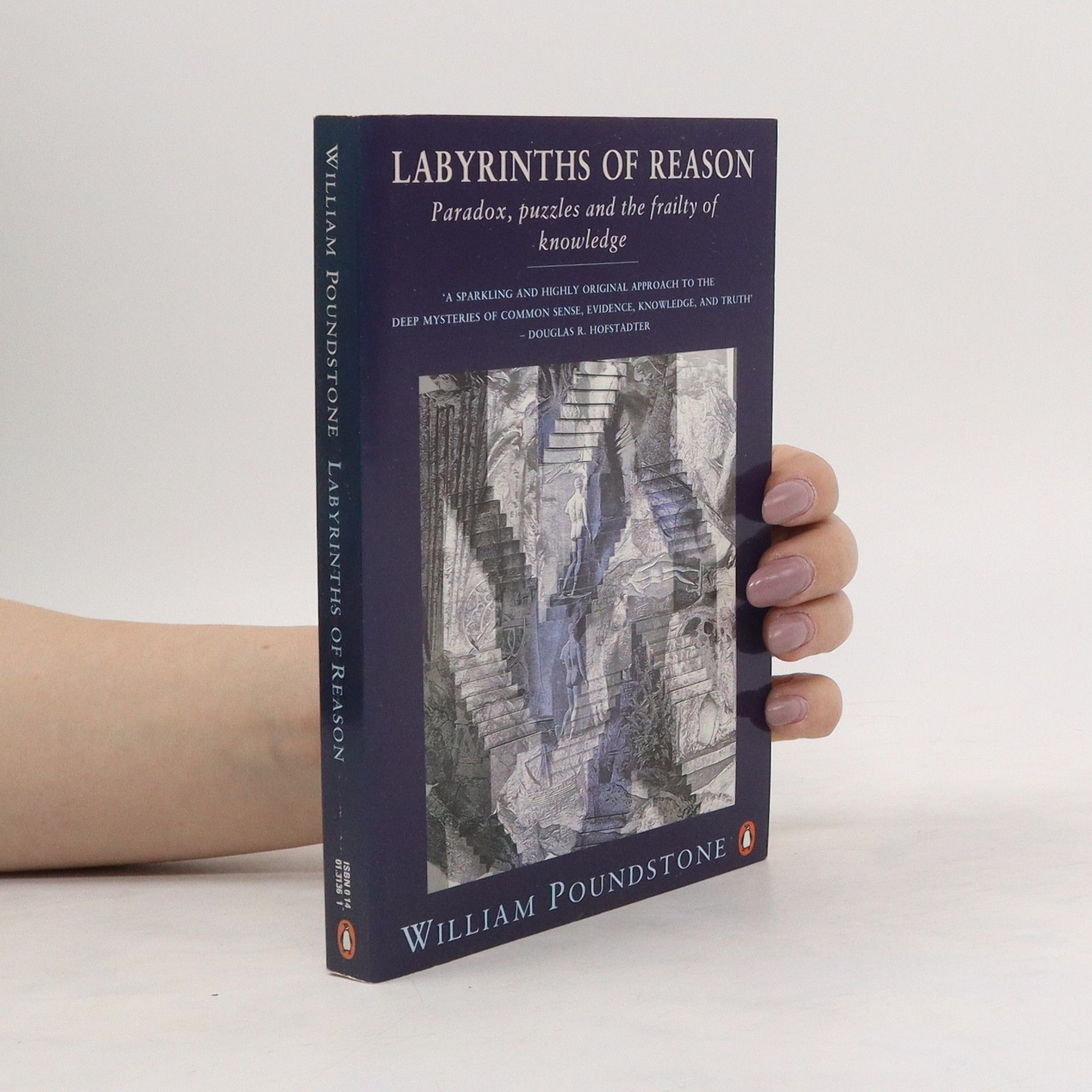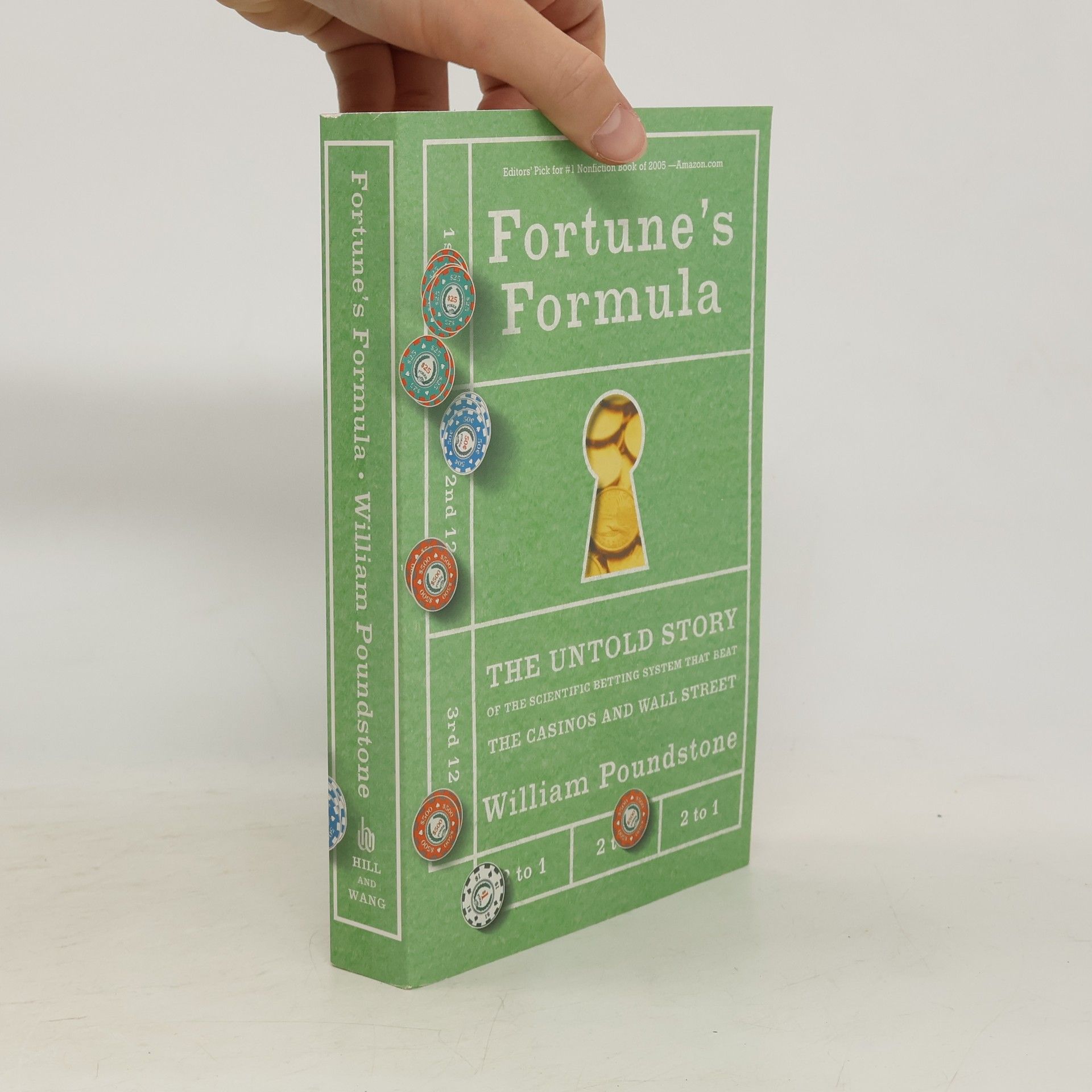How Do You Fight a Horse-Sized Duck?
- 320 pages
- 12 hours of reading
How to tackle the toughest interview questions Facebook, Amazon, Apple, Netflix and Google have to offer - and other perplexing problems to puzzle any mind!
William Poundstone crafts non-fiction that delves into the compelling interplay between scientific discovery and its societal and financial consequences. His widely-translated works explore the intricacies of human behavior and decision-making with sharp intellect and insightful analysis. Poundstone is celebrated for his penetrating style, adept at making complex concepts accessible to a broad readership. His writing provokes thought and offers fresh perspectives on the world.






How to tackle the toughest interview questions Facebook, Amazon, Apple, Netflix and Google have to offer - and other perplexing problems to puzzle any mind!
From the author of Are You Smart Enough to Work at Google?, a fascinating look at how an equation that foretells the future is transforming everything we know about life, business, and the universe. In the 18th century, the British minister and mathematician Thomas Bayes devised a theorem that allowed him to assign probabilities to events that had never happened before. It languished in obscurity for centuries until computers came along and made it easy to crunch the numbers. Now, as the foundation of big data, Bayes' formula has become a linchpin of the digital economy. But here's where things get really interesting: Bayes' theorem can also be used to lay odds on the existence of extraterrestrial intelligence; on whether we live in a Matrix-like counterfeit of reality; on the "many worlds" interpretation of quantum theory being correct; and on the biggest question of all: how long will humanity survive? The Doomsday Calculation tells how Silicon Valley's profitable formula became a controversial pivot of contemporary thought. Drawing on interviews with thought leaders around the globe, it's the story of a group of intellectual mavericks who are challenging what we thought we knew about our place in the universe. The Doomsday Calculation is compelling reading for anyone interested in our culture and its future.
How do you predict something that has never happened before? There's a useful calculation being employed by Wall Street, Silicon Valley and maths professors all over the world, and it predicts that the human species will become extinct in 760 years. Unfortunately, there is disagreement over how to apply the formula, and some argue that we might only have twenty years left. Originally devised by British clergyman Thomas Bayes, the theorem languished in obscurity for two hundred years before being resurrected as the lynchpin of the digital economy. With brief detours into archaeology, philology, and overdue library books, William Poundstone explains how we can use it to predict pretty much anything. What is the chance that there are multiple universes? How long will Hamilton run? Will the US stock market continue to perform as well this century as it has for the last hundred years? And are we really all doomed?
The real-world value of knowledge in the mobile-device age. More people know who Khloe Kardashian is than who Rene Descartes was. Most can't find Delaware on a map, correctly spell the word occurrence, or name the largest ocean on the planet. But how important is it to fill our heads with facts? A few keystrokes can summon almost any information in seconds. Why should we bother learning facts at all? Bestselling author William Poundstone confronts that timely question in HEAD IN THE CLOUD. He shows that many areas of knowledge correlate with the quality of our lives--wealth, health, and happiness--and even with politics and behavior. Combining Big Data survey techniques with eye-opening anecdotes, Poundstone examines what Americans know (and don't know) on topics ranging from quantum physics to pop culture. HEAD IN THE CLOUD asks why we're okay with spelling errors on menus but not on resumes; why Fox News viewers don't know which party controls Congress; why people who know "trivia" make more money than those who don't; how individuals can navigate clickbait and media spin to stay informed about what really matters. Hilarious, humbling, and wildly entertaining, HEAD IN THE CLOUD is a must-read for anyone who doesn't know everything.
John von Neumann, la teoría de juegos y la bomba
Los dilemas de la vida real surgen a partir de las diversas maneras en que nuestros intereses individuales se contraponen a los de los demás y a los de la sociedad en general. Muy a menudo nos vemos en la situación de tomar decisiones difíciles, a veces con resultados distintos de los que habíamos esperado. Se plantea entonces la siguiente cuestión, simple y a la vez apremiante: ¿existe un comportamiento racional para cada situación? En "El dilema del prisionero" se analiza este tipo de cuestiones a la luz de la moderna teoría matemática de juegos. William Poundstone presenta en este libro los aspectos fundamentales de tan importante teoría a través del análisis de casos concretos, en su mayoría de evidente relevancia sociológica. Asimismo, a lo largo de la obra se intercalan importantes facetas de la biografía personal y científica del creador de la teoría de juegos: el genial matemático John von Neumann.
A practical guide to outguessing everything from multiple-choice tests to the office football pool to the stock market. People are predictable even when they try not to be. William Poundstone demonstrates how to turn this fact to personal advantage in scores of everyday situations, from playing the lottery to buying a home. ROCK BREAKS SCISSORS is mind-reading for real life. Will the next tennis serve go right or left? Will the market go up or down? Most people are poor at that kind of predicting. We are hard-wired to make bum bets on "trends" and "winning streaks" that are illusions. Yet ultimately we're all in the business of anticipating the actions of others. Poundstone reveals how to overcome the errors and improve the accuracy of your own outguessing. ROCK BREAKS SCISSORS is a hands-on guide to turning life's odds in your favor.
William Poundstone beleuchtet in seinem Buch die Herausforderungen von Assessment-Centern bei Top-Firmen wie Google und Apple. Er erklärt, welche Absichten hinter kniffligen Fragen stecken und bietet kreative Lösungsansätze. Mit Anekdoten aus Bewerbungsgesprächen zeigt er, wie man trotz Unwissenheit erfolgreich bestehen kann.
You are shrunk to the height of a penny and thrown in a blender. The blades start moving in sixty seconds. What do you do? If you want to work at Google, or any of the world’s top employers, you’ll need to have a convincing answer to this and countless other baffling puzzles. Are You Smart Enough to Work at Google? Reveals the new extreme interview questions in the postcrash, hypercompetitive job-market and uncovers the extraordinary lengths to which the best companies will go to find the right staff. Bestselling author William Poundstone guides readers through the surprising solutions to over a hundred of the most challenging conundrums used in interviews, as well as covering the importance of creative thinking, what your Facebook page says about you, and what really goes on inside the Googleplex. How will you fare?
You are shrunk to the height of a penny and thrown in a blender. The blades start moving in sixty seconds. What do you do? If you want to work at Google, or any of the world’s top employers, you’ll need to have a convincing answer to this and countless other baffling puzzles. Are You Smart Enough to Work at Google? Reveals the new extreme interview questions in the postcrash, hypercompetitive job-market and uncovers the extraordinary lengths to which the best companies will go to find the right staff. Bestselling author William Poundstone guides readers through the surprising solutions to over a hundred of the most challenging conundrums used in interviews, as well as covering the importance of creative thinking, what your Facebook page says about you, and what really goes on inside the Googleplex. How will you fare?
Revealing how everday pricing manipulates us.